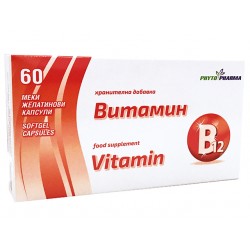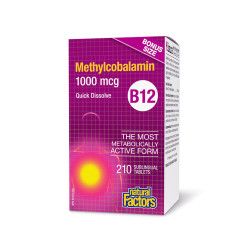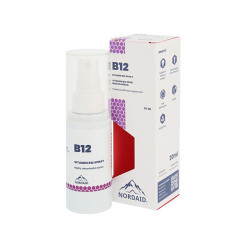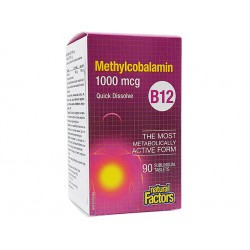Vitamin B12, also known as cobalamin, is a water-soluble vitamin that belongs to the B-complex group. It plays a key role in the production of red blood cells, the proper functioning of the nervous system, and the synthesis of DNA in the human body. B12 is found in animal products such as meat, fish, milk, and eggs. Its deficiency can lead to anemia and various neurological disorders. B12 is essential for good health and for the proper functioning of both the nervous and circulatory systems.
Why is B12 so important for the body?
Vitamin B12 is necessary for the production of blood cells, for normal brain function, and for the peripheral nerves. Its deficiency causes anemia and serious damage to the brain, spinal cord, and peripheral nerves, leading to symptoms such as impaired sensation, poor balance, reduced attention, and memory problems.
When consuming a balanced diet regularly, vitamin B12 accumulates in the liver, and reserves can last for 5–7 years. After that, switching to a restrictive diet (such as a vegan one) may result in a deficiency.
Other causes of B12 deficiency can include:
- impaired absorption of nutrients (e.g., due to atrophic gastritis);
- consequences of stomach or intestinal surgery;
- inflammatory bowel diseases;
- reduced production of stomach acid (which decreases the release of B12 from food, commonly seen in older adults);
- liver disease;
- parasitic infections (certain helminths utilize this vitamin for their vital functions, “robbing” the host);
- use of specific medications (e.g., long-term use of antacids, metformin);
- frequent use of so-called “laughing gas” (nitrous oxide)!
Symptoms of Vitamin B12 Deficiency
Vitamin B12 deficiency develops gradually. Initial symptoms include weakness, fatigue, drowsiness, shortness of breath during normal activity, pale skin, and dry or deteriorating skin condition. Appetite may decrease, sometimes leading to anorexia, as well as constipation and abdominal discomfort.
Cobalamin deficiency causes megaloblastic anemia, a condition in which red blood cells become enlarged and hemoglobin levels drop. Even without anemia, neurological damage can occur. In the early stages, altered sensation in the hands and feet appears, followed by muscle spasms and balance issues. Irritability and mood deterioration may also occur. In severe cases, confusion, delirium, hallucinations, and behavioral changes can set in. These symptoms are often difficult to distinguish from age-related dementia. Neurological symptoms that persist for long periods (months or years) can become irreversible.
Preventing B12 Deficiency
To prevent cobalamin deficiency, it is essential to maintain a diverse and balanced diet.
Foods rich in B12 include meat, poultry, liver, eggs, whole grain products, milk and dairy products, and seafood (such as mussels, oysters, mackerel, salmon, and tuna). In cases of confirmed severe deficiencies, B12 supplements in the form of tablets or injections may be prescribed. The duration of treatment depends on the cause and the extent of the deficiency. The form of the medication, dosage, and treatment duration should always be determined by a medical professional.
Make sure to consult a specialist if you notice pale skin, weakness, fatigue, dizziness, numbness or loss of sensation in the hands or feet, muscle weakness, unsteady gait, or issues with concentration or memory.









